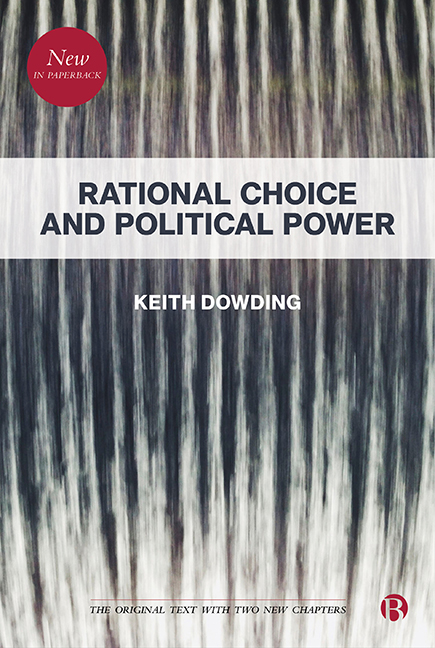1 - Introduction
Published online by Cambridge University Press: 30 April 2022
Summary
Introduction
‘Power’ is an elusive concept. Political power especially so. But, whereas natural scientists do not unduly worry themselves in defining the concept, social scientists do. Natural scientists measure the power of objects in terms of their capacities to do certain sorts of things. This, I shall suggest, is the way in which social scientists should deal with political power. But social scientists are at a disadvantage compared to their natural brethren. The subjects of their study are actors, and that means the subject herself chooses the way in which to behave and is not merely caused so to behave. This makes the quest for underlying causes harder, for there are fewer regularities from which to begin the search and those which do exist are harder to interpret. It also makes the study of political power much harder than the study of physical power. Sentient beings have some choice over the manner in which they behave. This makes measuring power more difficult. How much choice individuals and groups have is a major point of contention between competing conceptions of political power, as we shall see.
There are many competing definitions of political power, but none is authoritative. There is little point in giving a full-blown review of them all because providing a definition is not enough. We also require a method of demonstrating power in society. We want to know how much power different people have and why they have the amount they do. We want to know the outlines of the power structure. I do not provide a systematic review of the definitions of political power; most of the positions will emerge as I develop my own argument. This argument tries to explicate the important issues. The main positions have developed around a key dispute: behavioural methods of political analysis. On one side behaviouralists believe that they have demonstrated how individuals and groups may affect the policy outputs of government. On the other side ‘radical’ opponents believe that they have demonstrated that individuals and groups cannot affect the important issues in any significant way. Power is exercised long before individuals try to influence policy outputs. By the end of the 1970s the debate had become very sterile, with both sides apparently believing that they had won.
- Type
- Chapter
- Information
- Rational Choice and Political Power , pp. 3 - 18Publisher: Bristol University PressPrint publication year: 2019



